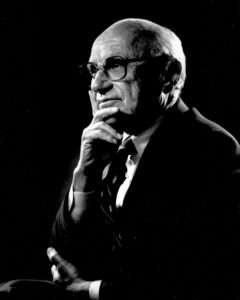The Volokh Conspiracy
Mostly law professors | Sometimes contrarian | Often libertarian | Always independent
What Milton Friedman Got Wrong About Immigration and the Welfare State
He was wrong to think "You cannot simultaneously have a welfare state and free immigration."

Immigration restrictionists love to quote Milton Friedman's line that "[y]ou cannot simultaneously have a welfare state and free immigration." There are lots of other rationales for immigration restriction. But this one has obvious resonance to people who otherwise favorite free markets. In a helpful recent post, economist Bryan Caplan, a leading expert on immigration policy, outlines why Friedman was wrong on this point. As Caplan points out, evidence indicates that most immigrants actually contribute more to the public fisc than they take out. The Congressional Budget Office estimates that the surge in migration since 2021 will reduce the federal budget deficit by almost $1 trillion over the next decade.
In addition, as Bryan notes, if immigrants really were a fiscal drain, there is the obvious "keyhole solution" of limiting immigrants' eligibility for welfare benefits. The US already does this to a substantial extent under the 1996 Welfare Reform Act, and such exclusion could be broadened, if necessary. When asked about this possibility in the same 1999 interview where he made the more famous comment about immigration, Friedman admitted he "ha[dn't] really ever thought" of it. That's understandable, given that immigration wasn't one of Friedman's areas of expertise, and he had never written a book or article about the subject. Even the greatest thinkers sometimes have poorly thought out views on issues they haven't studied carefully.
Bryan offers some additional well-taken criticisms of Friedman's comments on immigration, including pointing out that Friedman was wrong to suggest that "the movement of goods is a substitute for the movement of people." In some cases it is indeed a good substitute, but in many it is clearly not.
It's also worth noting that the idea that we can restrict liberty whenever doing so might substantially reduce welfare spending, has dire implications Friedman would have rejected in other contexts. Consider some examples:
"You cannot simultaneously have a welfare state and legalize alcoholic beverages."
If alcoholic beverages are legal, some people will become alcoholics, and become unable to hold down a job. They could end up on welfare. Also, alcoholism often leads to health problems that increase government health care expenditures, in a world where we have programs like Medicaid and Medicare.
"You cannot simultaneously have a welfare state and unrestricted consumption of fatty foods."
Eating too much food of this type can lead to obesity, and obesity - like alcoholism - often causes health problems that increase welfare state spending on health care. At the very least, this can justify heavy government regulation and taxation of such foods, even if not an outright ban.
"You cannot simultaneously have a welfare state and end the War on Drugs."
Like alcoholism and obesity, drug use often leads to health problems that in turn increase government spending on health programs. Plus, some drug addicts end up on welfare because they can't hold down a job.
"You cannot simultaneously have a welfare state and unrestricted reproduction."
The children of poor people are disproportionately likely to use welfare benefits. Even those from relatively affluent families are likely to consume public education spending.
Examples like this can easily be multiplied. Many, many exercises of liberty have potential downsides that can lead to increased welfare state expenditures in some situations.
You can consistently bite all these bullets if you're a thoroughgoing supporter of government intervention, as some conservative and left-wing paternalists are. But libertarians (and many others who value personal liberty) reject the welfare spending rationale for restricting liberty in these other cases, or at least presumptively do so (perhaps small decreases in liberty would be acceptable if they are the only way to prevent really massive spending increases). They should do the same when it comes to immigration restrictions.
Indeed, the potentially spending-minimizing regulations libertarians reject in these other cases are actually often much less severe constraints on liberty than immigration restrictions are. Most people can live a generally free and happy life even if they rarely or never drink alcohol, do not partake of any currently illegal drugs, and strictly limit consumption of fatty foods. By contrast, immigration restrictions consign millions to a lifetime of poverty and oppression. I don't know about you. But I'd much rather forego alcoholic beverages and most fatty foods than have to spend the rest of my life in Cuba or Venezuela. Immigration restrictions also severely limit the liberty (especially the economic liberty) of receiving-country natives, as well as that of would-be migrants.
Finally, it's worth noting that those who like to quote Friedman's statement on immigration and the welfare state generally overlook the fact that he was highly supportive of illegal immigration, because illegal migrants aren't eligible for most welfare benefits:
That's an interesting paradox to think about. Make it legal and it's no good. Why? Because as long as it's illegal the people who come in do not qualify for welfare, they don't qualify for social security, they don't qualify for the other myriad of benefits that we pour out from our left pocket to our right pocket. So long as they don't qualify they migrate to jobs. They take jobs that most residents of this country are unwilling to take. They provide employers with the kind of workers that they cannot get. They're hard workers, they're good workers, and they are clearly better off.
Friedman was largely right about illegal immigration. But making it legal actually improves the situation, by enabling migrants to work at a wider range of jobs, acquire more skills, and assimilate more fully. And the fiscal effects are still a net positive.
I critique the welfare-spending rationale for migration restrictions in greater detail in Chapter 6 of my book Free to Move: Foot Voting, Migration, and Political Freedom.


Show Comments (129)